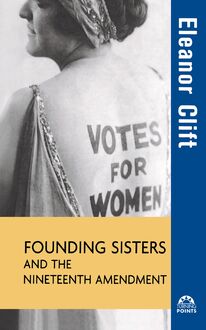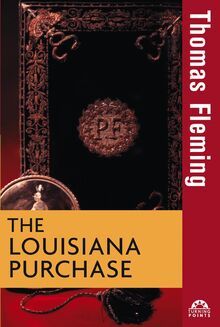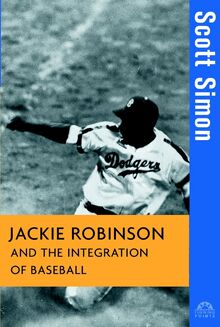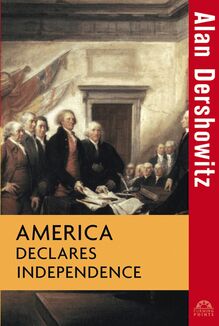America Declares Independence , livre ebook
79
pages
English
Ebooks
2008
Vous pourrez modifier la taille du texte de cet ouvrage
Obtenez un accès à la bibliothèque pour le consulter en ligne En savoir plus
Découvre YouScribe en t'inscrivant gratuitement
Découvre YouScribe en t'inscrivant gratuitement
79
pages
English
Ebooks
2008
Vous pourrez modifier la taille du texte de cet ouvrage
Obtenez un accès à la bibliothèque pour le consulter en ligne En savoir plus
Publié par
Date de parution
21 avril 2008
Nombre de lectures
1
EAN13
9780470303245
Langue
English
Some of us cherish it with near-scriptural reverence. Others simply take it for granted. In this contentious new look at the Declaration of Independence, however, celebrated attorney Alan Dershowitz takes "America's birth certificate" and its principal author, Thomas Jefferson, to task.
Dershowitz searches for the sources, history, and underlying reasoning that produced the Declaration and its particular language, from its reference to the "Laws of Nature and Nature's God" through the long list of complaints against the abuses of King George III. He points out contradictions within the document, notes how the meanings of Jefferson's words have changed over the centuries, and asks many disturbing questions, including:
- Where do rights come from?
- Do we have "unalienable rights"?
- Do rights to "life, liberty, and the pursuit of happiness" have any meaning?
- How could slaveowners claim to believe that "all men are created equal"?
- Is the God of the Declaration the God of the Bible?
- Does the Declaration establish a Christian State?
- Are there "Laws of Nature and of Nature's God"?
Acknowledgments.
Introduction.
Chapter 1. Who is the God of the Declaration?
Chapter 2. What Are "The Laws of Nature and Nature's God"?
Chapter 3. How Can Jefferson's Views of Equality and Slavery Be Reconciled?
Conclusion.
Appendix: The Declaration of Independence.
Notes.
Index.
Publié par
Date de parution
21 avril 2008
Nombre de lectures
1
EAN13
9780470303245
Langue
English
Preeminent writers offering fresh, personal perspectives on the defining events of our time
Published Titles
William Least Heat-Moon, Columbus in the Americas
Scott Simon, Jackie Robinson and the Integration of Baseball
Forthcoming Titles
Douglas Brinkley on the March on Washington William F. Buckley Jr. on the Fall of the Berlin Wall Eleanor Clift on Passing the 19th Amendment Thomas Fleming on the Louisiana Purchase Sir Martin Gilbert on D-Day
America Declares Independence
Also by Alan Dershowitz
The Abuse Excuse: And Other Cop-outs, Sob Stories, and Evasion of Responsibility
The Advocate s Devil: A Novel
The Best Defense
Chutzpah
Contrary to Public Opinion
Criminal Law: Theory and Process (with Joseph Goldstein and Richard D. Schwartz)
The Genesis of Justice: Ten Stories of Biblical Injustice That Led to the Ten Commandments and Modern Morality and Law
Just Revenge: A Novel
Letters to a Young Lawyer
Psychoanalysis, Psychiatry, and Law (with Jay Katz and Joseph Goldstein)
Reasonable Doubts: The Criminal Justice System and the O. J. Simpson Case
Reversal of Fortune: Inside the Von B low Case
Sexual McCarthyism: Clinton, Starr, and the Emerging Constitutional Crisis
Shouting Fire: Civil Liberties in a Turbulent Age
Supreme Injustice: How the High Court Hijacked Election 2000
Taking Liberties: A Decade of Hard Cases, Bad Laws, and Bum Raps
The Vanishing American Jew: In Search of Jewish Identity for the Next Century
Why Terrorism Works: Understanding the Threat, Responding to the Challenge
America Declares Independence
A LAN D ERSHOWITZ
John Wiley Sons, Inc.
Copyright 2003 by Alan Dershowitz. All rights reserved
Published by John Wiley Sons, Inc., Hoboken, New Jersey Published simultaneously in Canada
Design and production by Navta Associates, Inc.
No part of this publication may be reproduced, stored in a retrieval system, or transmitted in any form or by any means, electronic, mechanical, photocopying, recording, scanning, or otherwise, except as permitted under Section 107 or 108 of the 1976 United States Copyright Act, without either the prior written permission of the Publisher, or authorization through payment of the appropriate per-copy fee to the Copyright Clearance Center, 222 Rosewood Drive, Danvers, MA 01923, (978) 750-8400, fax (978) 750-4470, or on the web at www.copyright.com . Requests to the Publisher for permission should be addressed to the Permissions Department, John Wiley Sons, Inc., 111 River Street, Hoboken, NJ 07030, (201) 748-6011, fax (201) 748-6008, email: permcoordinator@wiley.com.
Limit of Liability/Disclaimer of Warranty: While the publisher and the author have used their best efforts in preparing this book, they make no representations or warranties with respect to the accuracy or completeness of the contents of this book and specifically disclaim any implied warranties of merchantability or fitness for a particular purpose. No warranty may be created or extended by sales representatives or written sales materials. The advice and strategies contained herein may not be suitable for your situation. You should consult with a professional where appropriate. Neither the publisher nor the author shall be liable for any loss of profit or any other commercial damages, including but not limited to special, incidental, consequential, or other damages.
For general information about our other products and services, please contact our Customer Care Department within the United States at (800) 762-2974, outside the United States at (317) 572-3993 or fax (317) 572-4002.
Library of Congress Cataloging-in-Publication Data:
Dershowitz, Alan M.
America declares independence / Alan Dershowitz.
p. cm.
ISBN 0-471-26482-2
1. United States. Declaration of Independence. 2. Jefferson, Thomas, 1743-1826-Political and social views. 3. United States. Declaration of Independence-Criticism, Textual. I. Title.
E221 .D47 2003
973.3 13-dc21
2002152554
Printed in the United States of America
10 9 8 7 6 5 4 3 2 1
This book is lovingly dedicated to my dear departed friends and colleagues Stephen J. Gould and Robert Nozick, with whom I taught together for so many years and on whose intellectual influences I will always be dependent.
Contents
Acknowledgments
Introduction
1. Who Is the God of the Declaration?
2. What Are the Laws of Nature and of Nature s God ?
3. How Can Jefferson s Views of Equality and Slavery Be Reconciled?
Conclusion
Appendix: The Declaration of Independence
Notes
Index
Acknowledgments
My declaration of dependence on those without whom this book could not have been written includes Eric Citron, who helped me with the historical research; Jane Wagner, who organized my office and typed the manuscript flawlessly; Hana Lane, my editor, who provided excellent editorial input; Helen Rees, my always innovative and caring agent; my family who, as usual, read the manuscript and told me what was wrong with it, and occasionally even what was right with it; and my friends Jeffrey Epstein, Michael and Jackie Halbreich, Stephen Kosslyn, and Rick Paterson for their warm support and inspired suggestions.
Introduction
American independence from Great Britain was achieved on the battlefield, but the establishment of a new republic, conceived in liberty, was as much a product of the pen as the sword. As Thomas Paine, whose own pen contributed to the willingness of colonial Americans to take up the sword, wrote several years after the American Revolution: [T]he independence of America, considered merely as a separation from England, would have been a matter of but little importance. It became an event worthy of celebration because it was accompanied by a revolution in the principles and practice of governments.
This book is about the revolution in principles wrought by the pens of American statesmen, rather than the revolution won by the swords and flintlocks of American patriots. Although it is difficult, as a historical matter, to separate the two, my focus will be on the words and ideas used to justify the revolution, and their enduring impact on the Course of human Events, most particularly the rights of men and women throughout the world.
I have always been intrigued by the Declaration of Independence. Though an important document of liberty, it is a hodgepodge of political, religious, and historical theories. It invokes the laws of nature, as if nature speaks with a single moral voice, and the law of nature s silent God, rather than Christianity s God of revelation. It describes rights as unalienable and declares that all Men are created equal, and yet it presupposes the continued enslavement of men, women, and children who were certainly being denied the unalienable right to liberty endowed to them by their Creator. From these natural and God-given rights, the Declaration shifts effortlessly to social contract theory, declaring that governments derive their just Powers from the Consent of the Governed rather than from some natural or divine law. The document then moves to a series of alleged wrongs committed against the colonists by the king. Some are profound, such as rendering the military superior to the civil power and denying the benefits of a trial by jury. Some seem trivial, even whiny, such as creating new offices to harrass our People, and eat out their Substance. Yet other descriptions of wrongs are shameful in their overt racism, such as the reference to the merciless Indian Savages, whose known Rule of Warfare, is an undistinguished Destruction, of all Ages, Sexes and Conditions. Finally, it invokes the claim of necessity, then proclaims a firm Reliance on the Protection of Divine Providence and pledges the lives, fortunes, and sacred honor of the signers to the cause of independence.
In light of this oft-conflicting rhetoric, it should come as no surprise that its words have been wrenched out of context by partisan pleaders to promote parochial causes. Natural law advocates point to the Laws of Nature. Libertarians focus on the claim of unalienable rights, especially that of Liberty. Most recently those who would break down the wall of separation between church and state try to use Thomas Jefferson s own words as battering rams against the structure he himself helped to build. Despite the fact that the Declaration expressly eschewed any mention of the Bible-since some of the most influential of our founding fathers were deists who did not believe in the divine origin of the Bible-modern-day advocates cite the Declaration s invocation of Nature s God and Creator as proof that we are a Christian or a Judeo-Christian nation founded on Scripture.
In the pages to come, I will examine the various intellectual, religious, and political currents that run through this complex and often misused document of liberty and explore its appropriate place in our structure of government.
This book seeks to reclaim the Declaration for all Americans-indeed, for all people who love liberty and abhor tyranny both of the body and the mind. A review of the history, theology, and political theory underlying the Declaration of Independence will demonstrate that its purpose was not only to provide a justification for our separation from England but also to provide a foundation for a new kind of polity based on the Consent of the Governed and, as Jefferson later wrote, the unbound exercise of reason and freedom of opinion. The Declaration itself was as revolutionary as the course of conduct it sought to justify to the Opinions of Mankind. Yet we must exercise considerable caution in extrapolating the words of the past to the issues of the present. As I will try to show, the very meanings of words and concepts change markedly with the times. As Oliver Wendell Homes Jr. wisely observed, a word is not a crystal, transparent and unchanged; it is the skin of a living thought and may vary greatly in color and context according to the circu







